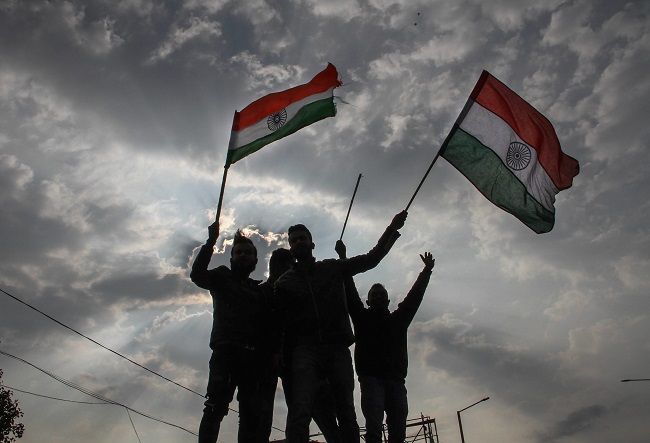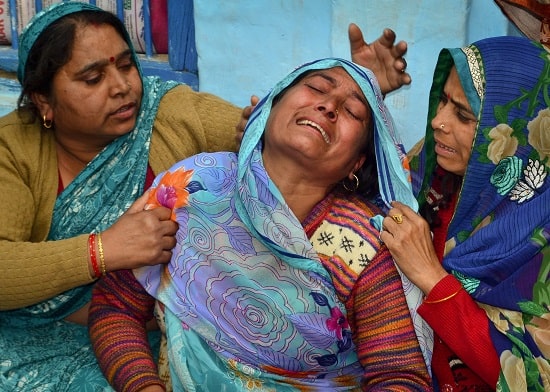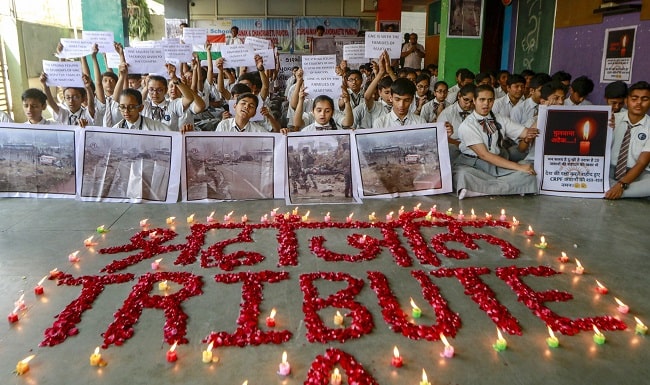
Prologue
The pall of gloom that descended on the entire nation with newsbreak of Thursday’s dastardly suicide attack on a CRPF convoy at Pulwama in South Kashmir has now transformed into widespread public anger and demands for appropriate retribution. However, as is wont whenever such tragic incidents occur, petty politicking and playing the blame game has already begun. This is not only very unfortunate but also a self-defeating exercise as in the cacophony of such unproductive discussion and debate we invariably miss the wood for the trees. While it’s very easy to demand strong actions like seeking revenge or even waging war to annihilate Pakistan, those who recommend such actions overlook the fact that these options have international ramifications and therefore can’t be executed at the click of a button.
Moreover, neither military action by itself nor pandering to the separatists alone can end this proxy war being waged against us by Pakistan. Such humongous tragedies bring back bitter memories of bygone days and suppressed emotions break free and goads one to give vent to personal views and feelings that may not necessarily be the most perceptive or inclusive. With this disclaimer in mind go ahead and read on.
Ending the Blame Game
Within hours of the Pulwama attack, the snapshot of an advisory purportedly issued by Jammu and Kashmir Police on February 8 went viral on social media. Addressed to CRPF as well as other security forces, this confidential communication mentions the likelihood of improvised explosive devices (IEDs) being planted by terrorists and advises soldiers to “sanitise” an area before occupying it. The first question that comes to mind after seeing this advisory on social media is, who made this secret communication public and why? However, if one realises how the prime focus during initial discussion on this incident suddenly shifted from “intelligence failure” to “security lapses,” the ‘how’ and ‘why’ behind this leak becomes quite apparent and thus needs no elaboration.
In this particular case the advisory reads, “before occupying your place of deployment please sanitise the area properly as there are inputs of use of IEDs. Matter most urgent.” On the face of it this communication appears to be a timely warning that the CRPF didn’t pay any heed to and because of which they had to pay a very heavy price. But on closer scrutiny, the advice to sanitise (search) the place of deployment makes clear that this advisory is referring to IEDs that terrorists often plant in deployment places used by security forces performing road opening duties so that soldiers can be targeted by detonating the concealed explosive device once they occupy these positions.
The reality is that advisories issued by intelligence agencies usually contain generic information and often appear to be based on speculation of anticipated attacks. Those who have served in J&K will recall regularly receiving intelligence advisories of the likelihood of a terrorist attack without any specific details of where, when and how are the terrorists are going to attack. Resultantly, while such advisories are of little use to soldiers on the ground, they serve as the fig leaf for preserving modesty of intelligence agencies whenever they fail to give timely information such as in the Pulwama suicide attack.
Acquiring intelligence in a hostile environment is undoubtedly a herculean task that gets even more difficult when it concerns asymmetric warfare since conventional templates of logical analysis don’t work in such a scenario. Therefore, it’s but natural that the rate of intelligence failure when it comes to timely uncovering of terrorism plots is always high and this needs to be accepted. Let’s not forget that even the FBI failed to unearth the 9/11 World Trade Center attack plot, even though it was an elaborate affair with more than one and a half dozen men who participated in this incident being aware of the plan of this terror attack.

Family members mourn the death of CRPF soldier Kaushal Kumar Rawat, at his residence in Agra. Rawat was amongst the 40 CRPF personnel who were martyred when the JeM suicide bomber attacked the CRPF convoy in Pulwama. (Phto: PTI)
Therefore, our intelligence agencies need to guard against the tendency of either adopting a ‘play safe’ approach by routinely issuing advisories or indulging in ‘one-upmanship’ by trying to beat each other by hastily arriving at conclusions just to be first to give an input. Trying to plant the idea that the Pulwama incident occurred since a very precise intelligence input was overlooked is not only unprofessional but also traumatises the bereaved families for life as they wrongly believe that their near and dear one perished due to organisational apathy.
Let our intelligence agencies have the moral courage to accept failure!
Playing Politics
The urge to show each other down is so overwhelming within India’s political class that whenever a major terror related incident occurs, instead of expressing solidarity with the government, the opposition starts criticising it. We saw the BJP flaying the UPA government in 2008 during the Mumbai attacks and in 2016, we witnessed Congress repaying the NDA government in the same coin after the Uri terror attack. Though Congress President Rahul Gandhi has displayed remarkable maturity by expressing solidarity with the Narendra Modi-led government after the Pulwama attack, the possibility of petty politicking getting the better of sagacity in just a couple of days remains very high.
Here we need to take a cue from Pakistan where despite the many existing serious political and ideological differences, all parties unite when it comes to passing any resolution against India or those in favour of the secessionist lobby in Kashmir. The government must be hauled over coals for its lapses by the opposition, but the prevalent practice of trying to score brownie points by holding it responsible for a terrorist attack is despicable.
Setting our Own House in Order
Many activists defend their insensitive remarks criticising the actions of security forces that are combating terrorism by evoking their constitutional right to freedom of speech and citing human rights concerns. Such prejudices or criticism doesn’t unduly offend security force personnel as they are faithfully discharging their duties and thus have a clear conscience. But what does hurt a soldier who is putting his life on the line daily when people pretending to be rights activists start championing the cause of those who are openly waging war against the nation and make no bones about their intention of dismembering the country.
Democracy gives us complete freedom of expression, but isn’t it pathetic to see learned people misuse this right to further their poorly disguised motivated agendas by casting unfounded aspersions on their professional integrity and even questioning their motives? As a veteran I would suggest my comrade-in-arms in active service not to get upset by these pseudo-intellectuals and brush off their criticism by recalling Aaron Sorkin’s famous words that “I have neither the time nor the inclination to explain myself to a man who rises and sleeps under the blanket of the very freedom that I provide, and then questions the manner in which I provide it!”
Appropriate Response
Politicians and analysts who accuse the government of lacking the resolve and courage to take punitive action against Pakistan, tend to forget that trans-border terrorism being patronised by the Pakistan Army in J&K is a full-fledged covert military operation. Hence any retribution won’t deter Rawalpindi from its aim of bleeding India ‘through a thousand cuts’ and therefore a broad-based response incorporating diplomatic, economic and military measures are essential for the desired effect. Simultaneously, if we want to militarily ‘punish’ Pakistan then we too need to be mentally prepared to face escalated violence levels as Rawalpindi won’t keep silent. Let’s not forget that since it is the Kashmiris who are fighting security forces and losing their lives in Pakistan Army’s proxy war in Kashmir, escalating the violence levels is not a big deal for Rawalpindi.
Therefore those of us who advocate adopting a proactive Israel like offensive policy against terrorist acts need to acquire the ability to face a heightened threat level and be prepared for hard times like the Israelis. They must also be practical and get over the ‘quick-fix’ mentality that is reflected in the complaint that India’s ‘surgical strikes’ have failed to end trans-border terrorism.
Though a lot of fancy remedies like ‘winning hearts and minds’ are being suggested by the intelligentsia for eradicating terrorism, the fact of the matter is that terrorism in J&K has today become an industry where romantic notions of terrorists being ‘misguided youth’ who can be brought back into the mainstream through acts of compassion and proper guidance doesn’t work.

School children in Ahmedabad light candles and pay tribute to CRPF soldiers who were martyred in terrorist attack at Pulwama. (Photo: PTI)
There are many who still maintain that violence in Kashmir is politically or ideologically motivated, but this is far from true. Though it may offend pseudo-secularists and those whose hearts bleed for secessionists, but the actual fact is that the so called ‘movement’ in Kashmir is totally Islamised. This isn’t my assessment- it’s what Syed Salahudin who heads the amalgam of terrorist outfits fighting in Kashmir admitted in an interview. What Salahudin said was that “The Kashmiri movement was Islamised from day one. Why do you think an educated young man who has a bright future otherwise, is willing to die? Azaadi is not his objective. He is into militancy because he knows that if he dies for a noble cause, he would become a martyr, as per Islam. We tell him that he would get into the ‘real life’ after this death and he would get peace.”
Does this revelation still leave any scope for blaming the unresolved Kashmir issue as the stimulus for terrorism in Kashmir?
Epilogue
Terrorism is a ‘dirty war’ that can’t be won by strictly adhering to the rules of engagement applicable to conventional warfare. Whereas it is not intended to suggest that we go to extremes like the Sri Lankan Army did in its final fight against the LTTE, but we can’t tackle terrorism by taking the other extreme of following ‘Gandhigiri’. In the mid-nineties, roads were cleared of all civilian traffic whenever a security force convoy passed through that stretch and though this caused some inconvenience to commuters, but it also prevented the Pulwama kind of attack. However, as time went by peaceniks and rights groups started clamouring for a reduction of security force ‘footprints on the ground’ as it traumatized the public and our leaders acquiesced by permitting civil vehicles to mingle with security force convoys. And, Pulwama was just waiting to happen!
